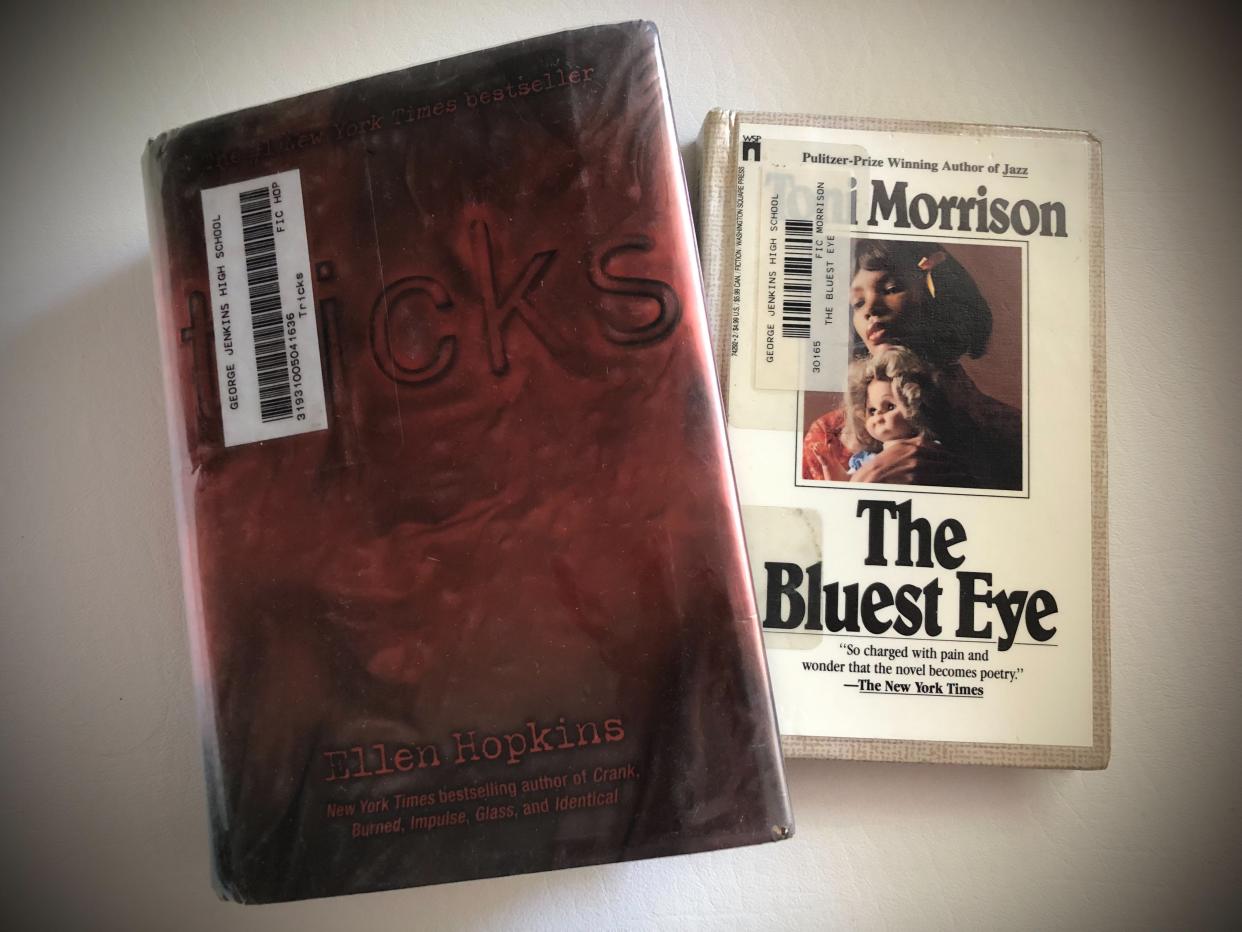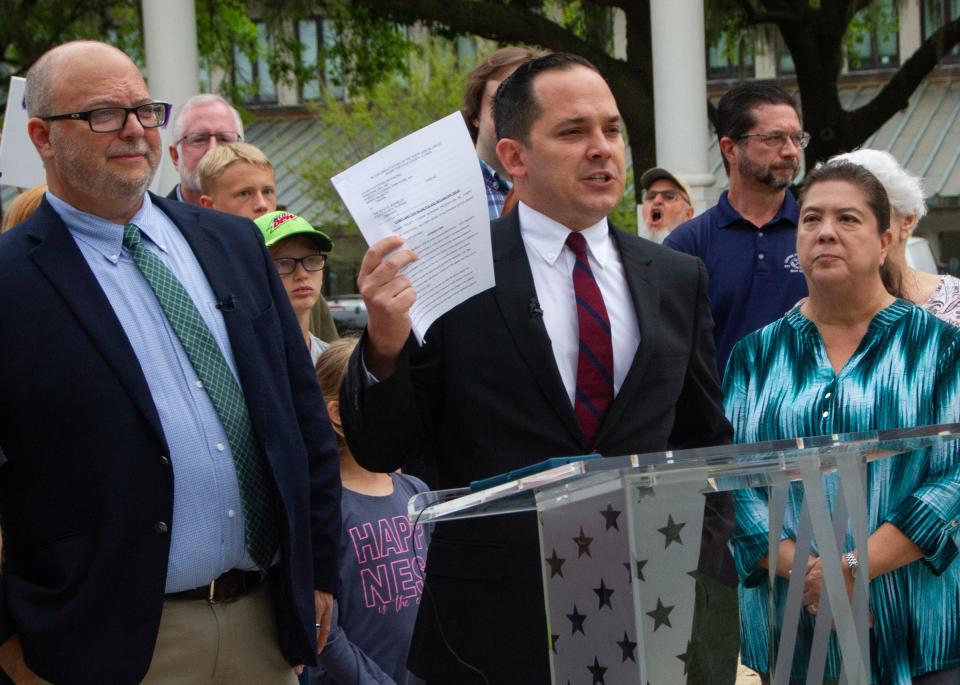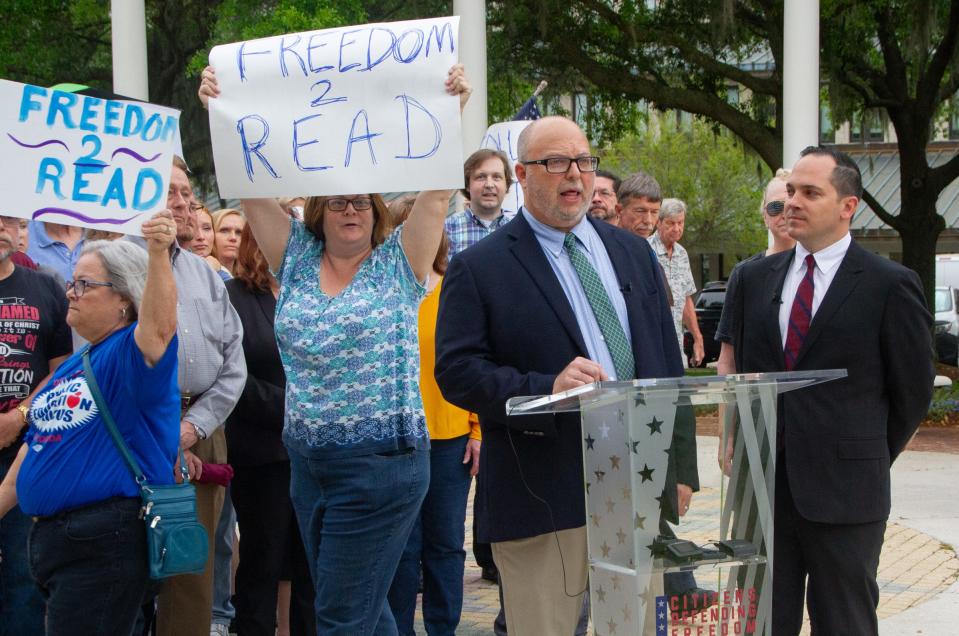Polk County Public Schools set to refine policy on responding to book challenges

- Oops!Something went wrong.Please try again later.
Polk County Public Schools is considering a new policy on handling challenges to books held in libraries and classrooms.
Superintendent Frederick Heid and the Polk County School Board discussed the proposed policy during a work session Tuesday. The draft largely responds to laws passed by the Florida Legislature since the district first adopted its policy in October 2022, as well as rules from the Florida Board of Education.
Among the changes from the current policy, the draft allows challenges to books in classroom libraries, not only in schoolwide libraries, as well as material used in classes or on assigned reading lists. The proposal also adds references to state laws defining prohibited sexual content.
The draft reflects one of three options for a revised policy provided by Neola, an education consulting firm contracted by the district.
Stacy Davis, the district’s library services director, said that the staff had made “a significant amount” of revisions in response to suggestions from an initial draft shared with School Board members at their March 19 work session.
Florida has seen a wave of complaints in recent years about books available in public schools, particularly those in libraries. Groups such as Citizens Defending Freedom, a conservative outfit based in Polk County, and Moms for Liberty have led the push, accusing some school districts of giving students access to books they consider to be pornographic or otherwise inappropriate.
Citizens Defending Freedom sued Polk County Public Schools in March over its policies on handling book objections. In an 11-page complaint, the conservative group alleged that the district was not following state law. Jason Geary, a spokesperson for the district, said that the proposed policy changes were not made in response to the lawsuit.
The Florida Legislature has passed bills in the past two sessions directing county school districts on how to manage challenges over books. While Gov. Ron DeSantis has amplified complaints about school materials, he said during this year’s session that some had taken advantage of the process.
The Legislature passed a bill in this year’s session restricting those who reside outside a particular county to one challenge per month of a book in that district’s libraries or classrooms. DeSantis has not yet signed the measure. There have been media reports of activists filing hundreds of challenges in counties where they do not reside.
Expanded grounds for challenges
An agenda item for the work session included the proposed policy, with color-coded suggestions for additions and deletions based on comments from the March 19 session. In one proposed change, anyone submitting a challenge must provide proof of Polk County residency.
Objections are first reviewed by a school principal, who may meet with a teacher, those making the challenge or both “in an attempt to resolve the objection, using an alternative instructional material,” the current policy states. If no resolution is reached that satisfies the challenging party, the principal will refer the matter to a district-level curriculum supervisor.
A proposed addition emphasizes that such a move is intended to initiate the school media committee review process.
The committee then receives a copy of the challenger’s submitted form. A proposed addition to the policy reads: “The school committee makes the recommendation to retain or remove the material.”
A list of reasons for objections inserts references to state laws defining pornographic content and descriptions of sexual conduct. The policy adds another basis for challenges — that a book “is inappropriate for the grade level and age group for which the material is used.”
In a proposed addition, any book facing a claim that it is pornographic or depicts sexual conduct must be removed within five school days and remain unavailable to students until the challenge is resolved.
Lake Wales Charter superintendent under investigation after employment grievances made
Parents have the right to read passages from any book that is subject to an objection, the policy states. If the district denies parental access because of content considered pornographic or sexual under state law or a Board of Education rule, the district must discontinue use of the material, a suggested revision says.
The draft clarifies that the superintendent must notify the School Board of a book complaint and then appoint a review committee. The proposal slightly alters the potential composition of such a committee.
Up to half of the panel would be parents of students with access to the material, instructional staff members (including certified library media specialists and English/language arts teachers) and non-employees with expertise in the subject matter. The draft deletes a mention of assigning one or more School Board members to a review committee.

In a proposed addition, the district would provide public notices of review committee meetings, which would be open to the public.
Just as the draft expands the criteria for challenges to include claims of pornography or sexual descriptions, committees would consider those elements in evaluating books, under the proposed revisions. Material found in violation could be removed pending the committee’s recommendation to the superintendent.
Committee recommendations would be due in writing to the superintendent within 15 business days following its formation, and the superintendent would report to the challenger within five days after that. An objector could then appeal the decision in writing within 15 days. The superintendent would forward the appeal and all relevant material to the School Board within five business days.
The School Board would then review the case during a publicly noticed meeting, taking a vote on whether to uphold the challenge. If board members find that the challenged book contains material barred under state law, it will be removed altogether or made unavailable to students in grades for which it is considered unsuitable.
The draft includes a final added section describing the rights of a parent who disagrees with the School Board’s decision. The challenger may ask the Florida commissioner of education to appoint a special magistrate, a lawyer with experience in administrative law, who would make a recommendation to the Board of Education within 30 days.
The Board of Education would then vote to approve or reject the recommendation at its next scheduled meeting. The school district is responsible for covering the fees generated by appointment of the special magistrate, the draft says, in keeping with state law.
CDF: Not enough change
Acknowledging a new state law, the proposed policy compels the district to file annual reports to the Florida Department of Education documenting all book challenges and the resulting actions.
The School Board must vote on all changes to policy. The earliest the proposal could be discussed at a meeting is June 11, Geary said.
In its lawsuit, CDF criticized the makeup of district’s review committees, said its meetings were not properly advertised and claimed that the district had not followed its own guidelines in reviewing appeals.
"We're happy that the school board is willing to change to their policy, however in the last two years the Board has never once followed their existing policy,” Anthony Sabatini, the lawyer who filed the lawsuit on behalf of CDF, said by email. “There needs to be substantial changes to bring the current policy in line with Florida law and statutes."

Robert Goodman, executive director of CDF's Polk County chapter, added: "While we are thankful that the Polk County School Board is considering potential changes to their policy, we are not seeing the changes needed to protect minor aged children from accessing books containing graphic rape, pedophilia, bestiality, incest and worse. If a parent wants their child to read about these subjects, they are able to purchase them."
Stephanie Yocum, president of the Polk Education Association, an employee union, attended Tuesday’s work session and said the policy changes seemed to be mostly necessary alignments with state law. Yocum criticized the Florida Legislature and DeSantis for imposing what she called unnecessary restrictions on schools and teachers.
Yocum said that many teachers in Polk County have already removed their classroom library because complying with state laws and rules has become burdensome. The state requires that all such books match lists of approved materials.
“I think this is just another example of our state legislators and our governor not letting home rule do its thing,” Yocum said. “It’s just one more interference with how local government can operate and function.”
Gary White can be reached at gary.white@theledger.com or 863-802-7518. Follow on X @garywhite13.
This article originally appeared on The Ledger: Polk school district refining policy on responding to book challenges

